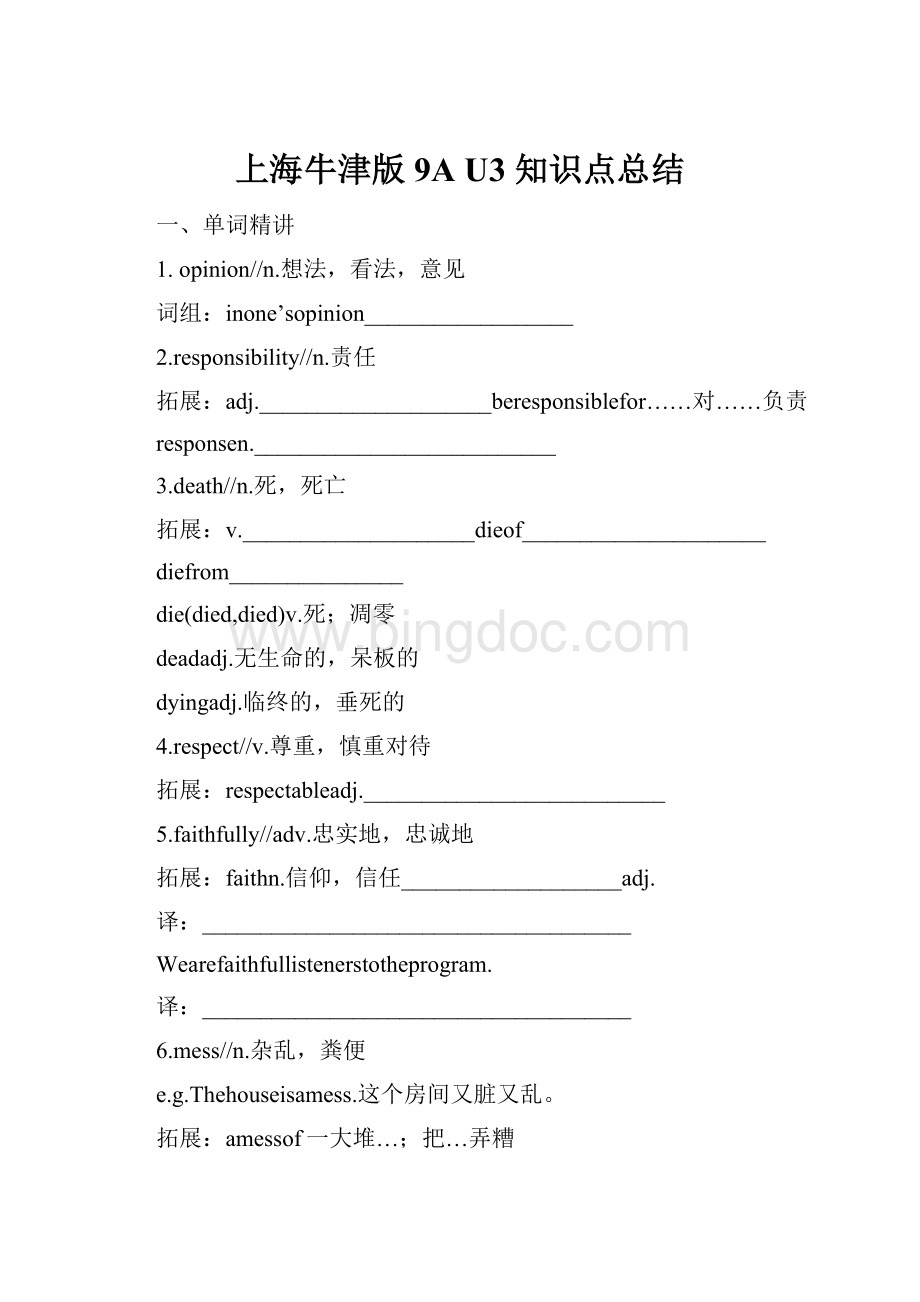上海牛津版9A U3 知识点总结Word文档格式.docx
《上海牛津版9A U3 知识点总结Word文档格式.docx》由会员分享,可在线阅读,更多相关《上海牛津版9A U3 知识点总结Word文档格式.docx(15页珍藏版)》请在冰点文库上搜索。

否定前缀un,加在名词,形容词,副词之前
如:
unfinished(未完成的);
undoubted(无疑的);
unhappy(不快乐的)
否定前缀in,加在形容词,名词之前
如:
incorrect(不正确的),inability(无能,无力),inaccurate(不准确的)
im一加在字母m,b,P之前如:
impossible(不可能的),impolite(不礼貌的)
9.surprised//adj.感到惊讶的
besurprisedat因…….感到惊讶
同义词:
amazed,shocked
surprising令人惊讶的
同类的词:
________________________________________
10.shocked//adj.震惊的
11.certain//adj.一定(量)的
becertainof/aboutsth.
becertainofdoingsth
becertainthat/if/whether
Ourteamiscertainofwinning.
I’mcertainthatit’snotyourfault.
13.goldfish//n.金鱼
合成词:
n.+n.=n.
举例:
________________________________________________
14.apologize//v.道歉
搭配:
apologizefor________________apologizetosb.
词转:
n.__________________
Makeanapologyforsth.因某事而道歉
15.review//n.(书刊、电影等的)评论;
v.回顾,检查
二、Phrases词组
1.fromsidetoside从左到右sidebyside肩并肩地;
一起
2.growup成长;
长大
3.accordingto据(……所说)…
同义句:
It’ssaidby
4.carefor关爱
takecareof照顾;
lookaftercareabout喜欢
5.asaresult因此;
结果
resultfrom起因于
6.stop…from阻止某事发生
stoptodosth.
stopdoingsth.
7.rightnow立即;
马上
immediatelyadv.atonce
e.gWeshouldstartworkrightnow.
Whenheheardthenews,herushedoutoftheroomimmediately.
8.What'
smore而且
e.g.What'
smore,mostpeopleinmoderncitiesliveinflats.
9.payfor为……付钱
e.g.Ihavetopay150dollarsforthesewingmachine.
其他表示“花费”的词
(1)spend的主语通常是人,往往用于以下句型:
(sb)spendsomemoney/sometimeonsth.
(sb)spendsomemoney/sometime(in)doingsth.
e.g.Ispentfiftyyuanonthecoat
=Ispentfiftyyuan(in)buyingthecoat.
(2)take常用于“占用、花费”时间,其主语通常为形式主语“it”或物。
句式是:
Ittakes/tooksb.sometimetodosth
=Sth.takessb.sometime.
e.g.Ittookmethreeyearstodrawthebeautifulhorses.
Theworkwilltakemetwodays.
(3)pay为“付款、赔偿”之意,主语通常是人,往往是
sb.payssomemoneyforsth
或paysb.(somemoneyforsth)
e.g.Ipaidfiftyyuanforthecoat
Howmuchdidyoupayhim?
(4)cost的主语必须是某物。
sth.cost(sb.)somemoney。
e.g.Thedictionarycostme$20.
10.notonly…butalso…不但……而且……
连接主语时,谓语动词应和邻近的主语保持一致。
相似的有:
neither…nor…;
either…or…
例句:
Heisnotonlyascientistbutalsoaphotographer.
Noonlyhebutalsohisparentslikecollectingstamps.
三、课文精讲
1.lt'
snicetopickthemupandholdtheminoararms,andit'
swonderfultoseethemgrowingup.
e.g.It’snicetoknowthatsomebodyappreciateswhatIdo.
【知识拓展】it作形式主语主要用于下列两种情况
1.It+is/was+adj./n.(形容词或名词)+todosth.
e.g.Itisagoodideatothinkthisway.
Itisverykindofyoutogivemeahandintime.
2.It+v.+todosth.
e.g.Ittookusthreeyearstocompletetheproject.
2.Youngpeoplecanlearnhowtocareforothersandhowtorespectalllivingthingsbykeepingapetdog.
e.g.Pleaseshowushowtodothat.
3.Asmallnumberofpetdogsevenbitepeople.
anumberof“许多”;
asmallnumberof“一小部分”;
alargenumberof“许多;
大量”
AnumberofpeoplehavealreadyvisitedtheExpoSite.
【辨析】anumberof与thenumberof
Anumberof表示“一批;
一些;
许多”;
是不定数量词,如同alotof,lotsof,several,some一样。
因此,“anumberof+复数名词”作主语时,其谓语动词用复数。
Therewerealargenumberofpeopleintheroom.Thenumberof表示“……的数(目)”,thenumber是中心词,其谓语动词必须用单数。
例:
Thenumberofpeopleintheroomislarge.
4.Thismaymakethedogsfeelextremelyunhappy.
1)make…feel“使……感到”,这种结构是动词后跟不带to的不定式。
相同用法的表示使、令、让、帮、叫等意义的不完全及物动词(使役动词)主要有:
_____________________________________________________________________________________________________________
Letmeintroducemyself.
2)feel,look,sound,smell,taste等连系动词后面跟形容词。
Annlooksbeautiful.
5.payingfordogfoodandvisitingthevetcanbeexpensive.
1)payfor“支付”,常用句型结构为:
somebodypaymoneyforsomething
_________________________________________
2)canbe表示现在或将来的可能性。
___________________
3)
【辨析】canbe,maybe,mightbe,mustbe
它们都可以用来表示可能性,但语气强弱有所不同。
mustbe语气最强,表示可能性最大;
其次是canbe和maybe;
mightbe语气最弱,表示可能性最小。
巩固练习
I.选择合适的单词或短语来代替划线部分。
A.Assaidby?
?
B.wentaway?
C.very?
D.departfor?
E.pleasure?
F.said?
(?
)1.Itwasclaimedthatsomedoctorswereworking80hoursaweek.
)2.Wewereextremelybusybeforetheexamination.
)3.Itisfullofenjoymenttogoskatingonrealice.
)4.Accordingtotheweatherreport,itisgoingtorainthisafternoon.
)5.A:
Whenwillyoubeback?
B:
I’llleaveforhomeinthreedays.
II.用所给单词的适当形式填空。
1.Theplanelanded__________atlastafterflyinginthestormforaboutonehour.(safe)
2.Pleasereadthepassage___________andthenfinishtheexercises.(care)
3.Somethingiswrongwithmyfoot.Ihavetowalk___________.(slow)
4.__________,weweren’tcaughtintheheavyrainlastnight.(luck)
5.Look!
Thefamousactressisdancingvery_____________attheparty.(beautiful)
6.Georgefeltverysadattheofhisfather.(die)
7.Thestormlastnightwasquite(fright);
wewereallgreatly(fright)byit.
8.Studentsshouldspendsometimedoingathomeeverydayafterschool.(review)
9.“Doyouhaveany?
”askedthesalesmanager.(complain)
10.Everyonewastodeathinthebigfire.(shock)
11.---Madam,doyoumindmysmokinghere?
---not.(certain)
12.Tothevisitors’greatsurprise,thepeoplethereshowdisagreementbytheirheads.(nod)
13.Youspeaktoo(loud).Wouldyousayitalittlemoresoftly?
14.It’ssaidthatperhapsthereusedtobethingsonMars.(life)
15.Thechildrenenjoyedatthepartylastnight.(they)
四、语法
一)、情态动词的被动语态
I、定义:
含有情态动词的被动语态用来说明某人或某物被动性动作所反映出的感情和态度。
1.Manytreesshouldbeplantedinthemountains.应该在山上种许多树。
2.Youcantakethisbookhome.(改为被动语态)
→Thisbookcanbetakenhome(byyou).
3.Thisproblemcan’tbeworkedoutveryeasily.这道题轻易算不出来。
4.Musttheworkbedoneatonce?
这项工作必须立即完成吗?
、含情态动词被动语态的构成
根据上述例子填写下列空格
A.含有情态动词的被动语态的结构为:
情态动词+_____+及物动词的______。
B.含有情态动词的主动语态变为被动语态时,要把主动语态的_____变成被动语态的主
语。
C.变为否定句时只需要在情态动词后加________。
D.变为一般疑问句时只需把________提到句首。
、句式变换
含有情态动词的被动语态的疑问句、否定句的变化均需借助于情态动词来完成。
1.一般疑问句。
直接将被动语态的陈述句中的情态动词提到句首。
例如:
Thisworkmustbedonerightnow.
→Mustthisworkbedonerightnow?
Hishomeworkshouldbefinishedbeforesix.
→Shouldhishomeworkbefinishedbeforesix?
2.特殊疑问句。
由疑问词加上含有情态动词的被动语态的一般疑问句构成。
Wherecanthebookbefound?
这本书在什么地方能被找到呢?
Whenmustmyhomeworkbehandedin?
我的作业必须什么时候交?
3.反意疑问句。
附加问句部分要用“情态动词+主语”。
Thisbookshouldn’tbetakenoutofthelibrary,shouldit?
这本书不应被带出图书馆,是吗?
4.否定句。
在情态动词后面加上not即可。
Fourteen-year-oldsshouldnotbeallowedtodrive.
十四岁的孩子不应该被允许开车。
【Note】
对于含有情态动词的被动语态的一般疑问句的回答,一般应保留原句中的情态动词,但must表“必须”时,其否定回答应用needn’t。
—Shouldmyhomeworkbefinishedtoday?
我的作业应在今天完成吗?
—Yes,itshould./No,itshouldn’t.是的,应在今天完成。
/不,不应在今天完成。
—Musthisexercisebookbehandedinrightnow?
他的练习本必须立即上交吗?
—Yes,itmust./No,itneedn’t.是的,必须立即上交。
/不,不必立即上交。
二)、副词
副词主要用来修饰动词,形容词,副词或其他结构。
I、副词的位置:
1)在动词之前。
2)在be动词、助动词之后。
3)多个助动词时,副词一般放在第一个助动词后。
注意:
a.大多数方式副词位于句尾,但宾语过长,副词可以提前,以使句子平衡。
Wecouldseeveryclearlyastrangelightaheadofus.
b.方式副词well,badly糟、坏,hard等只放在句尾。
HespeaksEnglishwell.
II、副词的排列顺序:
1)时间,地点副词,小单位的在前,大单位在后。
2)方式副词,短的在前,长的在后,并用and或but等连词连接。
Pleasewriteslowlyandcarefully.
3)多个不同副词排列:
程度+地点+方式+时间副词。
◆副词very可以修饰形容词,但不能修饰动词。
◆(错) IverylikeEnglish.
◆(对) IlikeEnglishverymuch.
◆副词enough要放在形容词的后面,形容词enough放在名词前后都可。
◆Idon'
tknowhimwellenough.
◆Thereisenoughfoodforeveryonetoeat.
◆Thereisfoodenoughforeveryonetoeat.
III、副词的构成方法:
大多数副词都是由“形容词+后缀-ly”构成的,
slowly,heavily,truly,terribly等。
形容词变副词规则:
①.在形容词词尾直接加-ly。
real-really;
helpful-helpfully;
careful-carefully;
slow-slowly;
quick-quickly;
quiet-quietly
②.以辅音字母加y结尾的形容词要变y为i,再加-ly。
busy-busily;
angry-angrily;
easy-easily
③.某些以辅音字母加不发音的字母e结尾和以-ue结尾的形容词要先去掉e,
然后再加-y或-ly。
terrible-terribly;
true-truly;
gentle-gently
注意:
friendly;
motherly;
lovely,weekly,lively等词是形容词而非副词。
④.英语中还有少数与形容词同形的副词,
daily,early,fast,hard,high,long,near,straight,well等。
判断下列单词的词性:
thehighjump跳高项目()tojumphigh跳得高()
afastcar行得快的汽车()todrivefast开快车()
anearlyriser早起的人()togetupearly起得早()
astraightline直线()Gostraightahead.一直朝前走。
()
.副词还可以由形容词加前缀a-得来,
loud(adj.)-aloud(adv.)
.部分名词加后缀也可变成副词,如:
part---partly。
例:
Itispartlyherfault.有部分是她的错。
注:
lovely等词是形容词而非副词。
练习巩固
一、选择题
1.treesusuallyinApril?
A.Have,plantedB.Are,plantedC.Do,plantD.Were,planted
2.Whenwegotthere,thebrokenroadrepaired.
3.Thewindowsoftheroomonceaweek.
A.hasbeencleaned
4.In1620,abouthalftheUSAforests.
5.Theyoungtreethestick.
6.Apresentmebymyfriendonmybirthday.
7.Bywasthebook?
A.who,wroteB.whom,write
C.whom,writtenD.whom,writing
8.Filmsaboutcrimeandviolence(暴力与犯罪)byyoungchildren.
9.Inwarmweatherfruitandmeatlong.
A.can’tbekept
10.Halftheworld’stelephonecallsinEnglish.
11.Thatbuildingnow.
12.ThetreesinourschooleveryFridayafternoon.
13.More“GreatGreenWalls”mustallovertheworld.
14.Hisschoolbagbyawomantenminutesago.
15.Itthatsheveryclever.
A.wassaid,isB.wassaid,were
C.issaid,isD.issaid,isbeing
16.Yesterdayavisitorsomethingabouthishometown.
17.Ifyouarenotfreetoday,comeanotherday__________.
A.too?
B.so?
C.instead?
D.yet
18.Hecan'
ttellus________,Ithink.
A.importantanything?
B.anythingimportant?
C.importantsomething?
D.somethingimportant.
19.Thelightintheofficewasn'
t________forhimtoread.
A.enoughbright?
B.brightenough?
C.brightly?
D.enoughbrightly
20.Youmustkeepyoureyes_________whenyoudoeyeexercises.
A.close?
B.open?
C.closed?
D.opened
21.Don'
tworry,sir.I'
msureIcanrun_________tocatchupwiththem.
A.slowlyenough?
B.enoughslowly?
C.fastenough?
D.enoughfast
22.Thetextisveryeasyforyou.Thereare________newwordsinit.
A.afew?
B.alittle?
C.few?
D.little
23.Mingminggotupvery_______,sohecametoschoolhalfanhour______.
A.late;
lately?
B.lately;
late?
C.lately;
D.late;
late
24.Iam________worriedaboutyparents'
healthyc